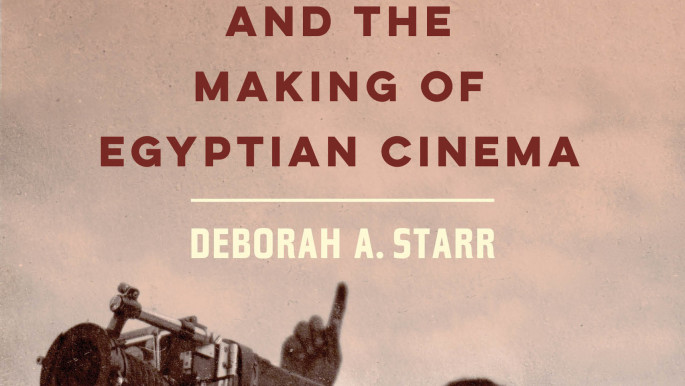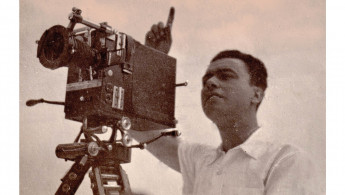Togo Mizrahi: The stateless pioneer of Egyptian cinema
He made films with Layla Mourad and Umm Kulthum, served as the secretary of the Union of Egyptian Cinema, was feted by the local press as "the director who does the Egyptian film industry proud" but was then quickly forgotten. However, a new book by Deborah Starr, Togo Mizrahi and the Making of Egyptian Cinema, has now unearthed his extraordinary life story and films.
Born in 1901 in Alexandria, Joseph Elie "Togo" Mizrahi was the spawn of an aristocratic Jewish family of Italian origins who had moved to Egypt in the 18th century.
Though both of his parents were born in Egypt, Mizrahi never held the nationality (as was the case with many Egyptians of immigrant descent and minorities since Ottoman times). This did not prevent him from playing a leading role in the local film industry whose national(ist) ambitions Mizrahi not only served, but publicly championed in the press, penning articles in its support.
Somewhat ironically, it was the exasperation of these same nationalist feelings following the Free Officers revolution of 1952 that would eventually result in his departure from both Egypt and filmmaking altogether.
 |
Togo Mizrahi was the spawn of an aristocratic Jewish family of Italian origins who had moved to Egypt in the 18th century |  |
Like many Arab Jews just before and after the occupation of Palestine, Togo Mizrahi was alleged to be a Zionist, accusations that the Palestinian cinematographer Nasri Hajjaj deems "groundless."
In 1946, the director was accused by the Egyptian newspaper Al-Misbah, edited by a Jewish journalist, of having provided technical assistance in the Arabic dubbing of two Zionist films, My Father's House (Herbert Kline, 1947) and Adama (Helmar Lerski, 1947). The same year also saw the release of what would turn out to be Mizrahi's last film, Malikat al-Gamal (The Beauty Queen) and his first trip to Italy where he would permanently relocate in 1952 (barely a decade after Italy's Racial Laws had institutionalized the persecution of Italian Jews under Fascism).
From his Italian exile the director continued to follow the developments of the Egyptian film industry and even planned a comeback.
 |
|
During a visit to his native country in 1949, Mizrahi revealed in an interview with Al-Istudiyu that he was working on an adaptation of The Count of Montecristo. The film would come out in 1950 as Amir al-Intiqam directed by Henri Barakat but with no involvement on Mizrahi's part.
In 1961, he lost the rights of the films he had produced and his company's assets were sequestered. Egyptian broadcasters took away his name from the credits when airing his films on television (a decision that was reversed after the Camp David Accords of 1979).
Very little is known about the years Mizrahi spent in Italy until his death in 1986, forty exact years after he'd shot and produced his last film.
While Togo Mizrahi's political views were never on public display, exception made for his vocal support for Egyptian cinema's patriotic function, if his films are anything to go by the stateless director seemed sceptical towards any form of essentialized identity, be it national, cultural or even sexual (which makes allegations of his supposed sympathies towards the ethnocratic politics of Zionism all the more dubious…).
As Starr convincingly argues in her book, Mizrahi's cinema is a subversive kaleidoscope of mistaken identities, pluralistic notions of nationalism and comical class conflicts. If the image of a Jew and a Muslim getting along and into troubles together in an Arab film might seem somewhat science-fictional these days, in the Egyptian cinema of the 30s and early 40s it did not raise an eyebrow. Which is why the (retroactive) celebration of "coexistence" can be problematic, inasmuch as it acquiesces to the debatable assumption that different confessions remain latently incompatible.
Mizrahi's films starring Chalom (Leon Angel, an Alexandrian Jew of Greek nationality) and his sidekick 'Abdu ('Abdu Muharram, a Muslim Egyptian actor) only today appear as some sort of moving testament to peaceful coexistence.
At the time of their release, films like The Two Delegates (1934) and Mistreated by Affluence (1937), both starring Chalom & 'Abdu, were seen as mere comedies starring two quintessentially Egyptian characters (tellingly, the only critique Starr reports in her book is that of an Egyptian Jewish spectator unhappy with the portrayal of a Jewish character in one of Mizrahi's films).
Neither critics nor the public, as far as it can be retrospectively ascertained, ever took issue with the onscreen representation of two men belonging to two different religions. If anything, Mizrahi's films debunked any binary presumption about ethno-religious identities and playfully exposed their hybridity and internal contradictions.
To the anti-Semitic stereotype of the wealthy Jew, his cinema opposed a view of Egypt's Jewish community which, like any other community, is divided into classes. One where cultural traits are ascribable to socio-economic status rather than confessional belonging. Starr notes in fact how "the Egyptian Jewish bourgeoise looked down upon the poverty and traditional religious values characteristic of the resident of Harat al-yahud, Cairo's medieval Jewish quarter, and many also spurned the use of Arabic."
 |
As Starr convincingly argues in her book, Mizrahi's cinema is a subversive kaleidoscope of mistaken identities, pluralistic notions of nationalism and comical class conflicts |  |
The connection between language and class is at the very heart of The Two Delegates, where Chalom and 'Abdu, both working class characters, are simultaneously rejected by their brides' mothers because of their economic status. While both Chalom and 'Abdu are arabophone, the Alexandrian bourgeoise they interact and miscommunicate with is francophone. In the film it is class rather than religion that lump people together or tell them apart.
Mizrahi belongs to a transnational generation of Arab Jews who not only considered the Arab world their home, but saw many of its members fighting against all forms of injustice, Zionism included.
People like Zeiza Gisèle Élise Taïeb, Georges Adda, Chehata Haroun, Abraham Serfaty, Henri Curiel, Youssef Darwish and many, forgotten others. His films, though politically "neutral" on the surface, are comical repudiation of exclusionary chauvinism and a timely reminder that ethno-religious identities are not political monoliths.
Rather than a generical cosmopolitanism, which in the Arab world as elsewhere is the exclusive preserve of the upper classes, Mizrahi's cinema documents and celebrates diversity not as some sort of liberal fetish, but as the very condition of human existence.
Conflict and injustice in his films have nothing to do with religion, Chalom's & 'Abdu's camaraderie is predicated on their shared social status rather than some ecumenical will to live together side by side. Though his intent might not have been deliberately political, the cinema of Togo Mizrahi is a vital contribution not only to Arab cinema but to the understanding of a region whose heterogeneity is methodically ignored.
Giovanni Vimercati is a freelance film critic and a graduate student at the American University of Beirut. Follow him on Twitter: @CLF_Project
The New Arab Book Club: Click on our Special Contents tab to read more book reviews and interviews with authors:
 |



